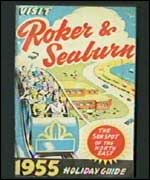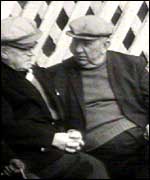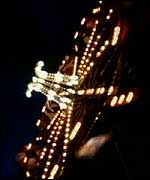|
The seaside was the only holiday that most people had, and trips were often to local resorts such as Seaburn, Whitley Bay or Redcar.
 |
|
Poster for Roker and Seaburn beach |
Down on the beach men set out their pitch whilst the women
were left to entertain the children.
The male of the family often cleared off to the pub for
a few pints with his mates.
Grab your bucket and spade as we take you on a trip to Seaburn and Roker beach, or why not travel by coach to Scarborough for a day out at the seaside?
During the late 1950s and 60s, the seaside took on a new role.
It offered 'forbidden pleasures' including the joys of the dirty weekend for courting couples who often booked into b'n'bs under false names.
On the Beach - Roker
 |
|
Men at the seaside |
Sunderland's seaside developed in the 1840s, and became a popular day trip. In 1880 Roker Park opened and became a huge attraction. The first day trippers came by foot, bus or train.
By the early 1900s there was also a promenade, a pier and bathing huts on the beach. During the 1920s the Promenade was extended to Seaburn.
In the 1930s many workers won the right to take paid holidays. Seaburn got a funfair complete with a helter skelter, fairground rides and other attractions.
The Sunderland Illuminations lit up the sea front for the first time in 1937, and became an annual event until 1959 when they stopped, only to be revived again in the 1980s.
The Fun of the Fair - Newcastle Hoppings
 |
|
A day out at the Hoppings |
The Hoppings in Newcastle first took place in 1882, and had its beginnings as a temperance festival.
The idea was to woo Geordies away from gambling and the demon
drink by encouraging them to go along to a staid family outing to the
fun fair.
In reality they still gambled but they also took the family to the Hoppings.
Quite soon the Hoppings was firmly established as an annual event and grew in size to take in a big variety of curiosities and side shows as well as funfair rides.
Amongst the many side shows have been 'the world's ugliest woman', 'the reluctant lady' and 'Anita - the world's smallest woman'.
More recent attractions like 'The Wall of Death' featured stunt motorbike riders performing death-defying tricks.
Holidays Abroad
Foreign holidays were for the wealthy few with large incomes
and time on their hands.
Rich families were able to travel in Europe, and get
away from it all on cruise ships to faraway places such as South Africa
and Australia. It wasn't until the 1970s that the average man and woman in
the street strated to think about foreign holidays.
The late 1970s saw the start of the package holiday boom
with the Costa Brava and the Costa del Sol in Spain proving popular with
Northern sun seekers.
It was the beginning of the end for the Northern seaside
town which couldn't compete.
|

